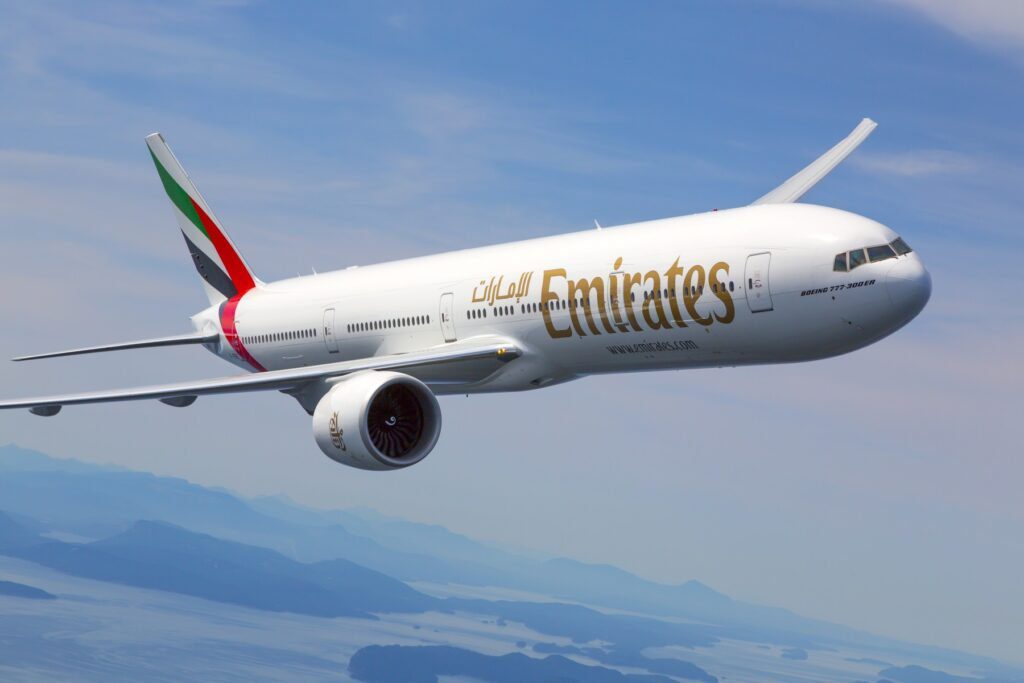In order to test one of its GE90 engines on a Boeing 777-300ER, Emirates Airline, located in Dubai, used 100% Sustainable Aviation Fuel (SAF), which is claimed to minimise carbon emissions across the fuel’s life cycle by up to 80%. The engine testing was successful. The test’s objective was to determine if the GE90 engine could operate on the specially mixed SAF without compromising its performance or without the need for any extra maintenance procedures on either the Boeing 777-300ER or the GE90 engine.
The airline’s first experimental test flight employing 100% SAF in one engine, scheduled to take off this week, will now proceed thanks to the ground test findings. According to Gulf Business, to better analyse the behaviour and performance of the fuel system under each fuel type, compare specific outputs of each engine, and ensure smooth operation of the aircraft’s engine and airframe fuel systems during the planned test flight, testing activities included running one engine on 100% SAF and the other on conventional jet fuel.
The aircraft underwent its routine pre-inspection procedures prior to the ground testing, which was conducted at the Emirates Engineering Centre in Dubai. After then, the Honeywell 331-500 auxiliary power unit (APU) was initially run on 100% SAF to start the stationary operation tests. The engines were then started by putting the APU under full load using SAF. Using the identical settings that would be utilised during the trial flight, the left engine was worked through its entire power range. This includes running at maximum speed and intensity for complete flight profile durations for the “idle,” “take-off,” and “climb” settings. The following 15 minutes were spent with the engines set to “cruise.” The simulation was completed, and then the engines were cooled.
To preserve the separation of test fuels, fuels were segregated in different fuel tanks. Engine data was retrieved once the ground test was finished for evaluation, comparison, and analysis. Throughout 2022, Emirates has been working on SAF fuel mix testing with its partners GE Aerospace, Boeing, Honeywell, Neste, and Virent, a division of Marathon Petroleum Corp. The partners worked together on the technical analyses and operational needs around ground testing and experimental flight operations to create a mix that has the same attributes and performance characteristics as conventional jet fuel.
The outcomes of this programme will offer further information and study on the components of biofuels and synthetic fuel blends, promoting standardisation and potential approval of 100% drop-in SAF. The airline will continue to develop these projects with the engine airframe makers and SAF suppliers in order to certify these mixes for use in commercial aircraft after the experiment on one engine was a success. At the moment, SAF may be used in mixes of up to 50% with regular jet fuel.
The airline routinely engages in activities to boost SAF deployment and has supported industry and governmental efforts to promote the growth of the SAF business. Its inaugural flight, using a Boeing 777 out of Chicago O’Hare airport, was powered by SAF combined with jet fuel in 2017. With the assistance of Swedavia’s Biofuel Incentive Program, it hoisted 32 tonnes of SAF for its flights out of Stockholm earlier that year and got its first A380 fuelled by SAF in December 2020. Additionally, SAF now offers flights departing from Oslo.
Emirates, GE Aerospace, and Boeing inked a Memorandum of Understanding (MoU) to create a programme for carrying out a test flight employing 100% SAF on an Emirates 777-300ER powered by GE90 engines during the Dubai Air show 2021. The World Economic Forum’s (WEF) Clean Skies for Tomorrow programme, which aims to encourage SAF deployment globally, includes Emirates on its steering committee. The airline has also helped the UAE government with its efforts to develop a SAF roadmap and a Power-to-Liquids Roadmap for the UAE, both of which have WEF backing.
In other news, a feasibility study will be conducted by Masdar, ADNOC, bp, Tadweer (Abu Dhabi Waste Management Company), and Etihad Airways to examine the possibility of producing sustainable aviation fuel (SAF) and other products like renewable diesel and naphtha using municipal solid waste (MSW) and renewable hydrogen. At the conclusion of Abu Dhabi Sustainability Week on January 19, the news was made.


